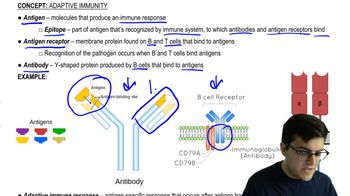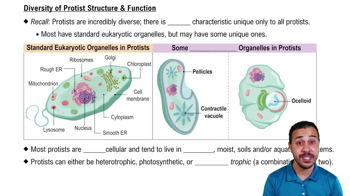What steps are required for most B cells to become fully activated and differentiate into plasma cells?
Which of the following outcomes would be expected if somatic hypermutation did not occur? a. The diversity of pattern-recognition receptors would be significantly lowered. b. B and T lymphocytes would not be able to produce receptors that recognize antigens. c. The adaptive immune response would not be activated by pathogens. d. The secondary immune response to a repeat infection would produce the same antibodies as those made in the primary immune response.
 Verified step by step guidance
Verified step by step guidance
Verified video answer for a similar problem:
Key Concepts
Somatic Hypermutation

Adaptive Immune Response

Antibody Diversity

Why is clonal selection necessary for the adaptive immune response but not the innate immune response? Select True or False for each statement. T/F The adaptive immune response uses receptors to recognize pathogens, and the innate immune response does not. T/F There is more receptor diversity in the adaptive immune response than in the innate immune response. T/F Cells in the innate immune response do not require activation, and those in the adaptive immune response do. T/F Clonal selection is used for targeting pathogens, and the innate immune response is used only to stop blood flow from the wound.
What would a vaccine have to contain to protect a patient from chicken pox? Explain why we don't have vaccines for HIV.
Propose a hypothesis to explain how self-reactive B cells are identified and eliminated during maturation.
What are two main criteria required for an RNA vaccine to be effective at protecting a vaccinated individual from a viral infection?
Self-amplifying RNA vaccines currently being developed are typically derived from alphaviruses—Class IV, positive-sense, single-stranded RNA viruses. Explain why an alphavirus is a good choice.
